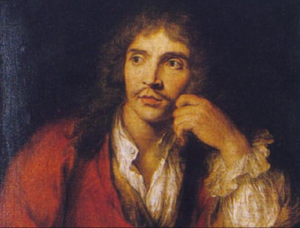Ojai Valley News
 Schemers, social butterflies, misanthropes, hypochondriacs, sycophants, the unctuous perpetrators of spurious piety… these were the targets at which Molière aimed his verbally wicked darts. Society matrons, religious figures, doctors, rich men, conniving women– no one escaped his merciless wrath! But it was wrath laced with comedy that often lampooned his victims without them realizing they had been lampooned.
Schemers, social butterflies, misanthropes, hypochondriacs, sycophants, the unctuous perpetrators of spurious piety… these were the targets at which Molière aimed his verbally wicked darts. Society matrons, religious figures, doctors, rich men, conniving women– no one escaped his merciless wrath! But it was wrath laced with comedy that often lampooned his victims without them realizing they had been lampooned.
During his time, Moliere’s company performed in the style labeled “commedia dell’arte.” This style of broad comedy traced back to the 16th century in Italy. Its purpose may be pure silliness, but there is a firm and lasting structure for evoking laughter which still works today in comedies you see on the stage, on TV, and in movies.
In “The Miser” opening Friday, April 5 at the Ojai Art Center Theater, Molière focused on the rich and greedy, a topic not far from today’s headlines. Molière based “The Miser” on a play by the Roman playwright, Plautus, who, in turn, based many of his stories on those of the ancient Greeks.
The brilliance of theatre lies in the way the stories are re-told throughout the centuries, and in doing so give the stories new meaning and new incarnations for the period in which they are presented. “The Miser” is a perfect example of bringing an old story first to the 17th century (it premiered in 1668) and with this recent translation by David Chambers and updated to the 19th century continues to illuminate, resonate, and challenge our sensibilities in the 21st century.
Through elaborate twists and turns, the play features Harpagon (portrayed by Cecil Sutton), who is absorbed with a single-minded obsession: money. He is paranoid that his children are out to rob him. He is loath even to speak the word “give.” He would rather marry his daughter off to a doddering old fool who can pay a dowry than entertain a trace of his daughter’s desires. He would choose to marry the love of his son’s life rather than allow the boy the fulfillment of his love for her.
In every aspect of his life, Harpagon is driven by his avarice and as a paragon of greed he exemplifies a multitude of facets that still plague our society today. The “greed is good” manifesto spills over into other areas besides money and still lives on in the distorted dreams of many, reaching to the highest levels of government, business, sports, entertainment and other aspects of our lives.
But this is not a play of doom or gloom. Be prepare to laugh, because, this being Molière, the entire play is filled with outrageous, absurdist comedy. Moliere was/is a master of that genre.
